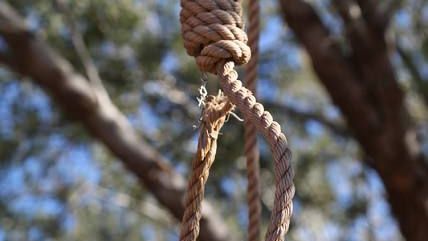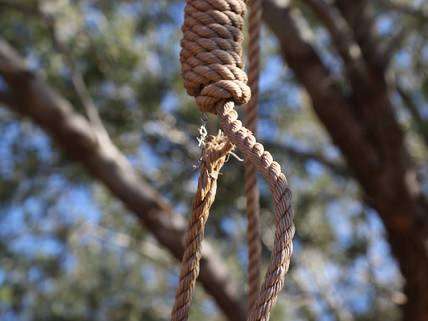Duke Student Who Hung a Noose on a Tree Made a Bad Pun. Expel Him Anyway?
Context matters


Duke University has been working through a racist incident that involved a student hanging a noose from a tree outside a campus building and leaving it there for hours. The noose, a reminder of the terrible history of violence against black people in America, is a racist symbol and was widely interpreted as a threat against black students.
It wasn't. The responsible student came forward, identified himself to administrators, offered a profuse apology, and gave a thorough explanation of his actions—which were born of obliviousness, not malice. The student wished to invite his friends to join him outside, and so he tied a piece of yellow cord around a tree branch, snapped a picture of it, and texted it to them as a request to "hang out."
As always, context matters:
Unfortunately, through my lack of cultural awareness and joking personality, I ended up unintentionally creating a huge mess for myself, my friends, my family and many members of the Duke community that I severely regret. I am the student who created the noose and after playing around with it left it hanging on a low tree branch next to a table where I had been sitting with some of my friends. At the time, I truly did not appreciate the historical sensitivity of a noose hanging in a tree.
I have explained my story to Duke Administrators and law enforcement officials as well. I told them the sequence of events whereby something that I made out of a piece of yellow cord I found, for what I considered at the time to be innocent fun, was instead taken for something so terrible. My purpose in hanging the noose was merely to take some pictures with my friends together with the noose, and then texting it to some others inviting them to come and "hang out" with us -- because it was such a nice day outside. If there was ever a pun with unintended consequences -- this was certainly one. In addition, when I left I carelessly forgot the noose hanging on the tree for the rest of the afternoon and the evening rather than discarding it, as I should have. As a result, people saw it and because of the historical meaning of a noose in the South, a fact that because of my background and heritage I was completely unaware of, conclusions were made that whomever had made the noose did it for racist reasons.
The student is unnamed, though various clues about his background and chats with informed sources led Inside Higher Ed to conclude that he is indeed a foreign student. Obviously, that detail strengthens the student's contention that he was unaware of the noose's history as a symbol of racially-motivated violence.
Which is not to say that his explanation entirely absolves him. Some mistakes, even completely unintentional ones, can cause enough harm to merit some kind of response. And indeed, the student cooperated fully with university and law enforcement investigations. He apologized over and over again. He pledged to educate himself about racial lynching, and is reading a book on the subject. Duke is satisfied with his actions, and will allow him to return to campus when classes resume next semester.
But for some—including Henry L. Washington, Jr., a black student at Duke—that's not nearly good enough:
This administrative announcement and this astonishingly lax sanction for a student, whose apology letter clearly re-articulated his or her lack of understanding for the significance of the act, are three additional "slaps" in the faces of black students and their allies. I am profoundly disappointed in what appears to be the university's decision to release an announcement declaring that racism was not involved in the hanging of the noose alongside such an ill-considered, audacious, and problematic "apology."
With such a presentation, you may have delegitimized the claims of our outcries. It may appear that you have actually disregarded black students' concerns. As it stands, you are setting a precedent that any act of racism or prejudice enacted against a minority student at Duke, no matter how serious, may be excused as long as that student's supposed intention was rooted in a lack of proper judgement and not in racism. Do you wish to revoke the assessment that you brought forth in the past few weeks--that the current state of race relations at Duke is unacceptable?
Washington goes on to demand that Duke select a harsher punishment. What that might be is left unclear. I imagine Washington, Jr. is suggesting expulsion; I reached out to him on Twitter and will update this post if he responds.
But I have a hard time agreeing that formal disciplinary measures are a better way to educate a student about racial violence than simply educating the student about racial violence—particularly when the student is willing to learn, and almost certainly not a proponent of racial violence. Issuing heavyhanded punishments—regardless of context or intention—is a surefire way to undermine the university's own promise to protect its students' rights to free speech. (See the absurd Indian swastika investigation at George Washington University for another example of this.)


Show Comments (163)